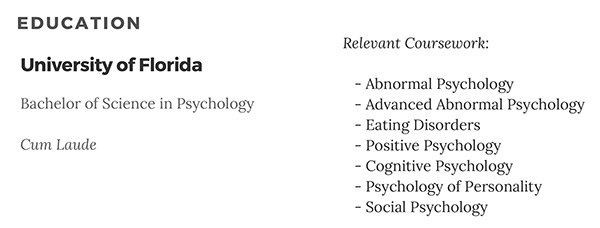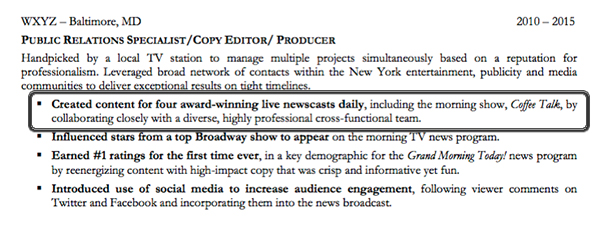You’ve finished four years of college—maybe more—and now the nine to five world awaits you. You’re eager to get started on your first job. But before that, you need to write your first resume.

Perhaps these questions are running through your mind:
- How do I show my education, achievements, and skills in a way that doesn’t make me look like a total newbie?
- What can I put on my work experience, if I don’t have any worthwhile job experience?
How can you set yourself apart from your batch mates, who are applying for the same jobs you are?
This tutorial answers the questions above and more. By the time you finish reading, you'll have a good idea of what to put in your first job resume and how to structure it—even if you have little to no work experience.
Essential Elements and Resume Structure for Fresh Graduates
1. Strong Opening or Summary
In CareerXRoad’s 12th Mystery Job Candidate survey, they created a fake resume and had volunteers send it to 100 different companies. The resume’s work history shows an interesting, almost too good to be true, applicant. But there’s no confirmation that the resume is a fake until the end of the document.
Six out of 100 companies invited Frank—the fake resume character—for an interview. But 66 employers ignored him, some of which may not have noticed the rouse. What does this finding tell you? Real or not, they won’t bother reading everything if you’re not interesting right off the bat.
Start your resume from a position of power. Write a summary that doubles as an elevator pitch. Describe your core skills and achievements, or add a tagline to establish your personal statement and brand. A good quote makes it easier for recruiters to recall your name.
Consider the examples below:


2. Education
“If you’re a fresh graduate with no internship or any experience relevant to the job you’re applying for, then it’s best to put education right after the summary”, says Career Coach Rachel Ritlop. Your professional history only comes first if you have a relevant employment or internship.
But having no work history on your first job resume doesn’t mean you don’t have a chance. Ritlop said the client managed to land a job using the 1-page, zero work experience resume:

Don’t forget to include GPAs higher than 3.0, special citations or honors (Cum Laude, Dean’s List, graduated with honors), and certificates you’ve received. You can also list course work related to the job you’re applying for.
3. Work History
About 91% of 225 employers surveyed by Millennial Branding, revealed that they expect students to have one to two internships by the time they graduate.
Internships are your best bet for gaining on-the-job experience, besides a paying job. Volunteer work and extra-curricular activities are also valuable. But it doesn’t carry the same weight as internships do in the eyes of employers.
Don’t downplay the value of your internship on your first resume, even if all you did was fetch coffee or make copies.
In the example below, the student’s job title at WXYZ is intern. But Certified Professional Resume Writer Joni Holderman, used a better job title of “Public Relations Specialist / Copy Editor / Producer," which encompasses all their roles in the TV station.
Combining the paid and unpaid internships, instead of dividing it into two entries, also helped. You won’t notice the resume is for a fresh graduate until you see the graduation date.

In the example above, the first bullet point states "Created content’ for several award-winning live newscasts daily." But if you read further, it explains how the student was, "collaborating closely with a diverse, highly professional cross functional team." Don’t be afraid to play up your experience, as long as you don’t stretch the truth out of bounds. You don’t want your resume to read as though you have too little job experience.
No Formal Employment Experience?
Steven Rothberg, President and Founder of College Recruiter, suggests you “look for experience in all places.” Even if the only job you’ve held is at a fast food chain, or as a baby sitter, those are still jobs.
Volunteer and extra-curricular activities also count, especially if you did something that demonstrates the skills needed in your target job. These activities can help display your skills when you have little to no work experience—or enhance the job experience you do have.
Were your communication skills instrumental in soliciting a sizable donation for your organization? Were you able to convince an influential guest to be a speaker in your event? Things like that add weight to an otherwise flimsy work history.
4. Skills and Accomplishments
List skills with your employment history on your first job resume, or put it in a separate section. Use bullets, or divide it into different sections, such as technical and soft skills so it's easy to scan.
Organizing files and receipts, dealing with grumpy and hungry people, taking care of kids, and tutoring are great soft skills to include on your resume.
Extras
Adding something extra will make your resume stand out. It also shows your passion for the job and initiative. Here are three extra sections you can add on your first resume:
- Testimonials: Pulled from LinkedIn, quotes from professors, or previous bosses in side-jobs or internships. Testimonials aren’t the same as references! References only list a name and number to call. But a good testimonial says something specific about you as a candidate.
- Portfolio: "An online portfolio, even one filled with personal, non-commissioned work, allows recruiters to build a better idea of your personality, skills, and talent", says Jillian Lockwood of Format. “A portfolio fills the gaps in your work experience and helps you stand out in a sea of indistinguishable applicants,” Lockwood adds.
- Thesis and Dissertation: This often applies to graduate students, but if you’ve written one and had the opportunity to defend it in a panel or publish it online, there’s no reason to leave it out. Finishing a thesis requires time and dedication, and employers know that.
Resume Writing Tips for Fresh Graduates
1. Tailor Your Resume to Each Job You Apply For
Recruiters can spot a resume sent en masse from a mile away. That’s why sending 20 to 100 resumes a day isn’t something to be proud of.
Research the job and company you’re applying for. Are your future boss and co-workers comprised of baby boomers or millennials? Their age group influences their workplace culture. Look at the company’s mission, products, and services. How can you connect yourself to them? Are you a fan of their products?
2. Use an Easy to Read Design and Layout
A study of recruiters’ resume reading habits using eye-tracking software reveals they “rated resumes with an obvious information hierarchy as ‘easier to read.”
So don’t make it hard for others to figure out who you are as a candidate. Your resume should be easy to read from top to bottom, not a magazine with an unpredictable layout.
It’s tempting to hide your lack of experience on your first job resume using a fancy layout. But that strategy can backfire once the recruiter runs out of patience reading it. The design should make it easier to scan and read, and not more difficult. There are a number of clean, minimal style resume design templates that you can use to make a professional impression as an applicant.
3. Get Outside Perspective
Have someone else read your resume out loud. It could be anyone, a career counselor in your university, a contact who works at the hiring company, a friend, or a professional copy editor.
Many fresh graduates either over estimate or under estimate their achievements and skills. Sometimes, it’s just hard to find the right words. That’s why you need outside help, to spot the awkward sentences, outlandish claims, grammar mistakes, and weak words, in your resume.
4. Use a Referral Whenever Possible
Recruiters routinely screen out resumes for any number of reasons. But there’s one trick guaranteed to get their attention: a referral.
According to Jobvite’s 2012 Index, only 7% of applicants for a given position are referrals, but they make up to 40% of hired applicants.
See if your target employer has a referral incentive program. If they do, check if anyone in your network is working there, or at least has a second degree connection with one of their employees. Then introduce yourself and ask to be referred. In most cases, they’ll be happy to refer you because of the incentive they’ll get.
5. Use Power Words
Forget duties and responsibilities. Think big. Compare the following:
- Called sales leads to set-up product demos, which yielded $10,000 in sales in one month.
- Converted cold leads into warm prospects and earned $10,000 in revenue in one month.
With a few changes, the second bullet reads like the applicant played a huge part in making those sales, compared to the first one where it looks like the only contribution made was a phone call.
Download a list of power words you can use on your first resume from this tutorial:
6. Add the Right Keywords
Recruiters and large companies use an Applicant Tracking System (ATS) to keep track of all the applications they receive via email and online job platforms. ATS allows recruiters to search the database for resumes that contain attributes they’re looking for, such as “licensed CPA” or “2 years computer graphics experience.”
Having the right keywords can be the tipping point between getting an interview, or getting trapped in the black hole of recruitment, as what some recruiters call the ATS.
It’s not enough to just add the keyword once, you have to sprinkle it in different parts of your resume.
For example, using 'computer graphics' as a keyword:
- Technical Skills: Modeled computer graphics using Sketch, and Illustrator.
- Summary: Well-versed in creating 3D computer graphics for different types of media.
- Education: XYZ School of Graphic Arts, BS Multimedia, Major in 3D Animation and Computer Graphics Design.
There’s Always a First Time for Everything
Yes, it would be better if you could add more job titles and accomplishments to your resume. That will come in time. Your first resume is just that—the first of many resumes you’ll write throughout your career. But with a few resume writing tricks, you can portray yourself in the best way possible to recruiters.
Editorial Note: This content was originally published on January 18, 2016. We're sharing it again because our editors have determined that this information is still accurate and relevant.

No comments:
Post a Comment